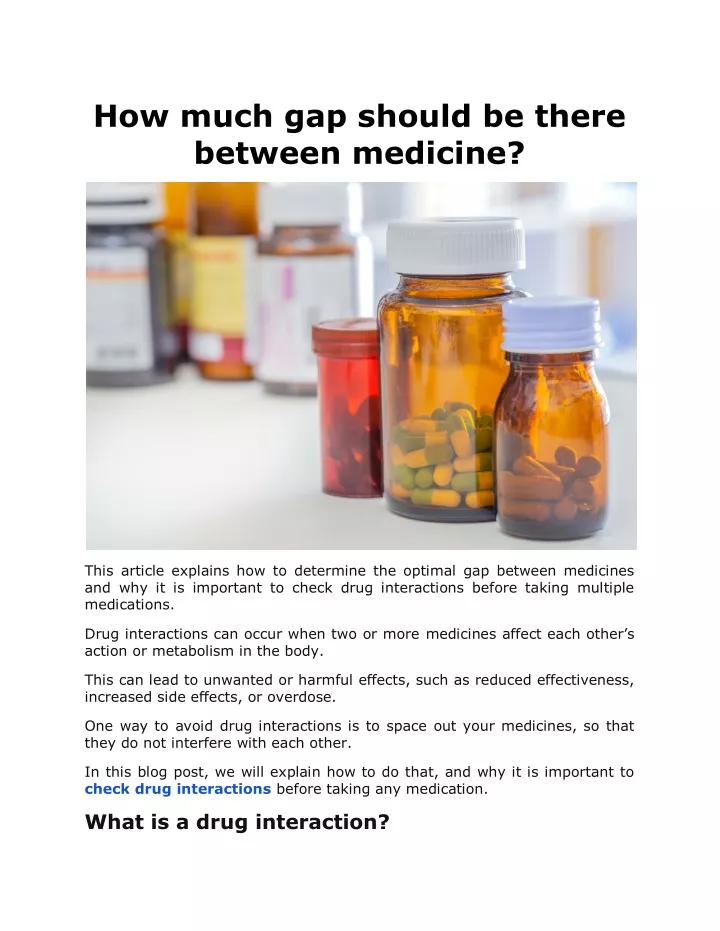
30 likes | 39 Views
https://thesunrisepost.medium.com/how-much-gap-should-be-there-between-medicine-ad1b68be7805

E N D
How much gap should be there between medicine? This article explains how to determine the optimal gap between medicines and why it is important to check drug interactions before taking multiple medications. Drug interactions can occur when two or more medicines affect each other’s action or metabolism in the body. This can lead to unwanted or harmful effects, such as reduced effectiveness, increased side effects, or overdose. One way to avoid drug interactions is to space out your medicines, so that they do not interfere with each other. In this blog post, we will explain how to do that, and why it is important to check drug interactions before taking any medication. What is a drug interaction?
A drug interaction occurs when one medicine affects the way another medicine works in your body. This can change the effectiveness or safety of either or both medicines. For example, some medicines can increase or decrease the blood levels of another medicine, which can lead to overdose or underdose. Some medicines can also enhance or reduce the intended or unwanted effects of another medicine, such as pain relief or bleeding risk. Drug interactions can occur between prescription medicines, over-the- counter medicines, herbal supplements, vitamins, minerals, food, beverages, and alcohol. Some drug interactions are mild and may not cause any noticeable problems, but others can be serious and even life-threatening. How to find out the gap between medicines? The best way to find out how much time you should leave between different medicines is to read the labels and instructions carefully. You should also consult your doctor or pharmacist if you have any questions or concerns. They can advise you on how to take your medicines safely and effectively. Some general tips to follow are:
Follow the directions on the label or prescription exactly. Do not take more or less than the recommended dose, or take it more or less often than instructed. If the label says to take the medicine with or without food, follow that advice. Food can affect how some medicines are absorbed and metabolized in your body. If the label says to avoid certain foods, beverages, or alcohol while taking the medicine, follow that advice. Some substances can interfere with how some medicines work or cause unwanted side effects. If you are taking more than one medicine that has the same or similar active ingredient, such as ibuprofen or acetaminophen, do not exceed the maximum daily dose of that ingredient. Taking too much of the same ingredient can cause overdose and liver damage. If you are taking more than one medicine that belongs to the same or similar class of drugs, such as antidepressants or blood thinners, be aware of the potential for additive or synergistic effects. If you are taking more than one medicine that has opposite effects, such as stimulants and sedatives, be aware of the potential for antagonistic effects. Why is it important to check drug interactions? Checking drug interactions before taking multiple medications is important for several reasons: It can help you avoid harmful or unpleasant side effects, such as nausea, drowsiness, bleeding, seizures, or allergic reactions. It can help you prevent serious complications, such as organ damage, blood clots, heart problems, or coma. It can help you optimize your treatment outcomes, such as pain relief, blood pressure control, or infection clearance.
